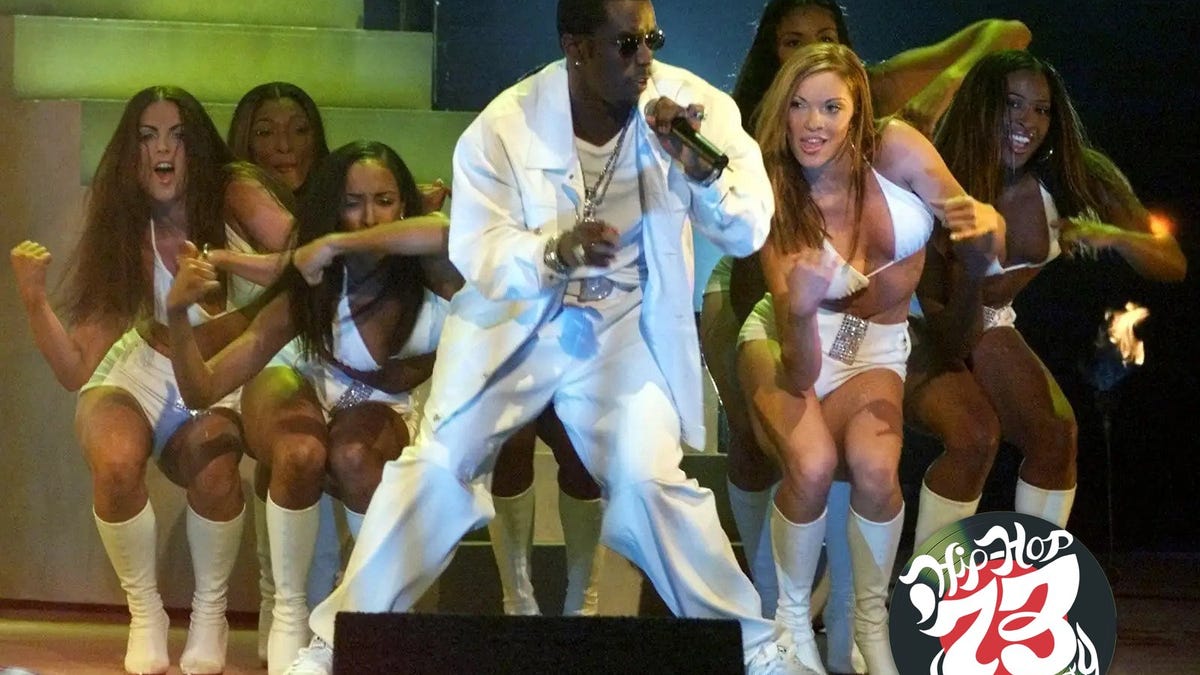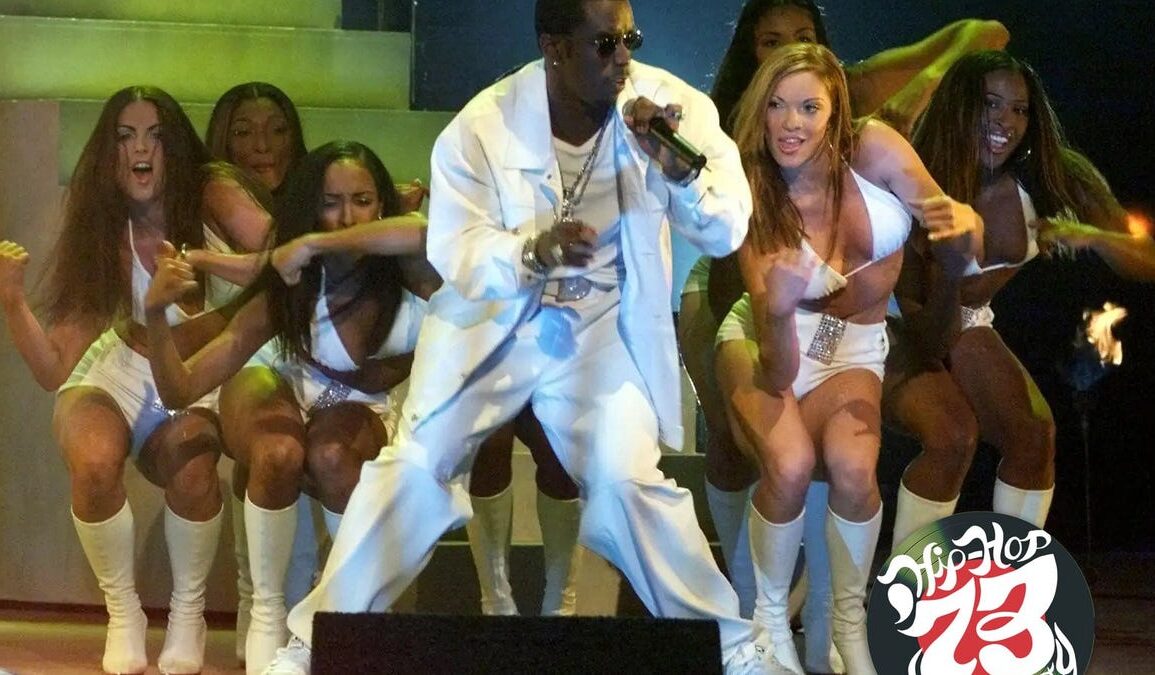
This story is part of our new Hip-Hop: ’73 Till Infinity series, a celebration of the genre’s 50th anniversary.
Hip-hop, so the legend goes, was born at a party. The date was Aug. 11, 1973. Location: a rec room at 1520 Sedgwick Avenue in the Bronx, New York City. Clive Campbell, known as DJ Kool Herc, was in charge of the music, while his sister, Cindy Campbell, worked the door.
Advertisement
If you count Sedgwick as the true birthplace of hip-hop, 2023 marks the genre’s 50th birthday. Of course there’s disagreement on the date: Hip-hop was already ringing out through the discothèques of Harlem during the 1960s, pioneered by the likes of DJ Hollywood and Eddie Cheeba, as New York University professor Dan Charnas recently wrote in the Wall Street Journal.
What is undisputed is that hip-hop, as a musical genre and a cultural movement, emerged from Black communities in New York during a time of deep financial crisis and rising gang violence. In the decades that followed, hip-hop became a medium of resistance and a vehicle for voicing the Black struggle against systemic racism and poverty.
Advertisement
Advertisement
“They got money for wars, but can’t feed the poor,” Tupac Shakur rapped in “Keep Ya Head Up,” one of his most famous political anthems. “We ain’t meant to survive ‘cause it’s a set-up. And even though you’re fed up, huh, you got to keep ya head up.”
Hip-hop started as a grassroots form of Black expression, but has since become a global, multibillion-dollar industry. Quartz spoke with Emmett Price III, the inaugural dean of Africana Studies at Berklee College of Music in Boston, about the business, origins, and evolution of hip-hop. The following interview transcript has been edited for clarity and length.
Quartz: How did hip-hop emerge as a genre?
Price: The musical genre comes out of a river of Black creative expression. Rap music, the early predecessor of what we now call hip-hop, emerged in the late ‘60s, early ‘70s. And the young people in the five boroughs of New York City decided to use their self-determination and their brilliance to coalesce an artistic formulation, and move it from a genre to a cultural expression. When you think about music and dance, and you think about deejaying and fashion, when you think about the sense of entrepreneurialism, there was a groundswell that turned into a movement.
Advertisement
When did hip-hop start becoming commercialized?
By the early 1980s is when corporate entities began to see the connection between rap music, hip-hop culture, and youth culture. These young people from New York City understood the dynamic thing that they were creating and called it a culture, which made it much more than the music.
Advertisement
The Olympics in Los Angeles in 1984 were a pivotal moment, because many corporate entities got behind the use of hip-hop culture as an American expression on a global space. You have the break dancers in the opening celebration, and hip-hop music as a kind of iconography or sound of America. Now all of your Pepsis and Coca-Colas, all of your Adidas and Nikes, they participated in this and hip-hop became a globally recognized brand that, as it spread, became an economic driver. Not just in the entertainment industry, but in other industries too.
What’s a number that sticks out to you in hip-hop’s history?
By the early ‘90s, more than 70% of all hip-hop assets were being purchased by young, white suburban kids. And this shows the influence because hip-hop was an urban music. So if all the kids in the suburbs were the biggest participants in this economic stream of it, then corporations thought, “Whoa, we got to get in on this as well.” And that’s what helped to fuel the engine. It was not so much that the hip-hoppers were trying to generate profits—which they were. It was also the outside saying, “we want to do something about what’s happening on the inside,” and that’s what created the economic engine, but also some of the severe challenges within hip-hop culture.
Advertisement
What are some of those challenges?
Sometimes you use your inside voice and sometimes you use your outside voice, and there are some conversations that are inside-voice conversations that were being exported to outside voices. When outsiders pick up on insider language, the question is, “Can I participate in that or is that not for me?”
Advertisement
The use of the n-word is something that has been an inside situation that Black folks are still wrestling with. The NAACP, a number of years ago, had a ceremony to bury the n-word to suggest that it’s not helpful, but actually harmful to Black people. However, Tupac Shakur, a phenomenal artist, said that the n-word can be reformed and redefined as never ignorant and getting goals accomplished. He took the letters of that and created a new definition.
I don’t condone the misogyny that we see both in terms of lyrical language as well as the use of bodies in music videos and whatnot. But that is a real conversation that happens in various neighborhoods. The challenge is that those conversations become commodified.
Advertisement
What kind of narratives do you think hip-hop is selling?
If the huge patronage of hip-hop culture is outside of the hip-hop community, if they are voyeurs or spectators trying to figure out what’s going on in there without having to go there, then they’re looking for all the shiny, glittery, and controversial stuff. Gangsta rap in the mid-‘80s is going to sell a whole lot of units to make a whole lot of money because folks can sit in the suburbs and feel like they understand what gang violence is all about without having to engage in it. And then folks can be in Japan or England and feel like they understand what’s going on in America. The narratives become a huge challenge, when one narrative begins to define an entire people who are more complicated and more complex than that narrative. And that’s been a tension within hip-hop culture and the way that hip-hop has proliferated and been presented by the media.
Advertisement
But there is a small-d democratic opportunity for everyday people to participate in hip-hop. Because hip-hop allows you to have free expression. hip-hop now has an economic engine where I can actually purchase beats and samples and have access to that on my laptop or my phone. And I could put together my own work and record my own album on my laptop or my iPad. I can do that without having a degree in music and I can be a voice for what’s going on relative to what I see, experience, and know. What that does is it moves us away from a hyper-curated narrative.
Why do you think hip-hop has global appeal, and what’s different between the US and global hip-hop industries?
When you talk about hip-hop in China, and you talk about hip-hop in Russia, or you talk about hip-hop all over the world, hip-hop has been used as a voice of the people to really focus on that small-d democracy that I was talking about. When people feel ostracized, disenfranchised, and they feel like they don’t have a voice or privilege, relative to what privilege means in those spaces, hip-hop has been a unifying force to aggregate and coalesce people and allow them to speak truth to power.
Advertisement
Why is this different in the US?
Because of what I call the platinum carrot. If I’m in the United States, and I’m going to an ostracized community, and I’m disparaged in whatever ways I am, I know that if I can just get a hit, that hit is going to make me a whole lot of money and it will change my socioeconomic situation. I am willing to do what I need to do in order to get that hit. I’m willing to say the things that I probably know are inappropriate. I’m willing to do the things that probably don’t make sense, in order to get that shine, get that spotlight so I can make that money. Controversy breeds curiosity, which creates sales. So there is a huge difference between what’s going on nationally here in the United States and globally.
This post was originally published on this site be sure to check out more of their content.









